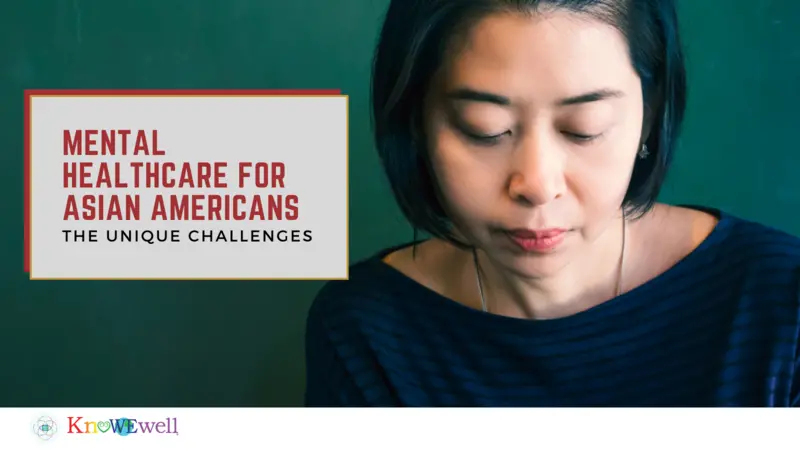

Mental and Behavioral Well-Being

Mental and Behavioral Well-Being
The Unique Challenges of Mental Healthcare for Asian Americans
Asian Americans are the fastest growing racial group in America—with a population that increased 72%, to 19 million, between 2000 and 2015. They are also the least likely racial group to seek mental health services, according to data from Mental Health America (MHA). Nearly 3 million people who identify as Asian American reported a mental illness in 2019, a figure that is likely an underrepresentation of the true number.
Impact of Racism on Mental Health
Mental health issues for Asian Americans have skyrocketed since the onset of the pandemic, amid the rise of anti-Asian discrimination and hate crimes. Even as the number of overall hate crimes dropped in the US in 2020, hate crimes against Asian Americans rose by nearly 150% in major cities during that year, according to research by the Center for the Study of Hate and Extremism. More than four in five Asian adults say the population has faced an increase in discrimination in the past year. Women reported twice as many hate incidents as men in the year between March 2020 and February 2021, according to Stop AAPI [Asian Americans and Pacific Islanders] Hate. Those who experienced discrimination were three times as likely to report depression, anxiety, and symptoms of post-traumatic stress disorder as others.
A tracking poll of Asian adults in the US conducted this year by Morning Consult found that 35% said their mental health has worsened during the pandemic. Nearly 60% said reports of anti-Asian racism and violence have affected their mental health—even more than other pandemic stressors such as quarantining, school closures, and work stoppages. In addition to being more frequent targets of hate incidents, Asian women are also much more likely than men to say discrimination affects their mental health.
Dr. Anne Saw, associate professor of clinical-community psychology at DePaul University and a board member for the Asian American Psychological Association, says the Morning Consult poll results powerfully show how widespread the problem is, even as they likely underestimate the impact of racism on Asian American mental health because the survey was conducted only in English and may have missed older people or recent immigrants.
Even before the pandemic, Asian Americans had some of the highest rates of depression and suicide compared to other racial groups, according to the Asian American Federation. Data from the Centers for Disease Control and Prevention (CDC) show that suicide is the leading cause of death among Asian Americans between the ages of 15 and 24, a statistic not shared by any other racial group in the US.
More than four in five Asian adults say the population has faced an increase in discrimination in the past year.
The increase in anti-Asian attacks, combined with other COVID-related worries such as sharply higher long-term unemployment rates among Asian Americans has led to elevated levels of stress and anxiety for the Asian American population. A study published in Ethnic and Racial Studies found that Asian Americans who experienced COVID-era racial discrimination also reported higher levels of anxiety and depression, a finding consistent with other research that connects racial discrimination with an increased risk for chronic mental health problems.
Barriers to Mental Health Treatment
Experts say the increase in risk factors for mental health problems is especially concerning because Asian Americans face barriers to mental healthcare and disparities in mental health treatment. The 2012 National Latino and Asian American Study found that Asian Americans are three times less likely to seek mental healthcare than White Americans. MHA says Asians are, in fact, the least likely racial group in America to seek mental health services. A new AthenaHealth study tracked more than 24 million people between May and December of 2020 and found Asian patients in the US were more than 200% less likely to receive a diagnosis for depression or anxiety than White patients.
However, the differences between Asians and Whites in perceived need for mental health treatment do not explain the wide disparities in the extent to which these groups access mental healthcare, according to a 2019 study published in Psychiatric Services. The stigma of mental illness is one of the biggest barriers to seeking treatment for the Asian American community. Many Asian cultures tend to keep issues like mental health, which they deem to be private, within the family, and rely only on the community for advice. The perception of bringing shame to the family can discourage seeking outside help, causing many to overlook, deny, or ignore mental health symptoms.
Religious beliefs vary among different Asian cultures but many Asian religions perpetuate the idea that mental illness is a sin or a punishment from God, or in some cases that mental illness represents an interruption or imbalance of energy flow in the body. Further, many 2nd or 3rd generation immigrants may be reluctant to share their struggles knowing that their parents or grandparents experienced suffering or difficult circumstances that make their own problems pale in comparison.
The perception of bringing shame to the family can discourage seeking outside help.
For decades, Asians have lived with the “model minority myth,” the idea that they are a high-achieving social group that has overcome racial bias. They may strive to meet these expectations even at the cost of their emotional health, downplaying frustrations, pain, and setbacks. Pop culture perpetuates this stereotype with media portrayals of Asian American characters. James Kyung-Jin Lee, associate professor of Asian American Studies at University of California, Irvine, says, “Even if you enjoy some measure of wealth or status, your feeling of belonging is always precarious.”
Despite the model minority stereotype, Asian Americans have experienced a long history of discrimination and racial attacks. From the earliest wave of Asian immigration in the 1850s, Asians were subject to racist mob attacks and exploited for cheap labor. Helen H. Hsu, PsyD, former president of the Asian American Psychological Association, says recognizing the history of anti-Asian violence can relieve some of the individual burden on mental health: “Understanding the context takes away some of the shame or blame that can come up when people feel targeted.”
Beyond cultural barriers to mental healthcare, cost and access significantly impact mental health treatment. Asian Americans are less likely than their White counterparts to have health insurance. A new National Urban League report found more than 60% of Asian Americans don’t have access to mental health resources. The undocumented, elderly, or low-income populations face additional obstacles to accessing medical care, according to the Stop AAPI Hate analysis.
They may have difficulty finding Asian therapists to whom they can relate, and very few therapists are trained in cultural competency.
Many Asian Americans feel they are unable to find mental health professionals that understand issues specific to their own experiences, which can lead to the assumption that mental healthcare is not for them. Nearly half of Asian Americans are unable to access mental healthcare because of language barriers—either they don’t speak English or they can’t find mental healthcare providers that speak their language. They may have difficulty finding Asian therapists to whom they can relate, and very few therapists are trained in cultural competency. The 2019 study published in Psychiatric Services found Asian respondents cited “not knowing where to go” as a barrier to mental health treatment more often than White respondents.
Systemic Changes Underway
The American Psychological Association has issued a statement committing to valuing diversity, but translating a commitment into real-world change will take time. Nellie Tran, an Asian American psychology professor at San Diego State University, is trying to rectify this gap by training a new generation of diverse therapists to bring their cultures into their practices to improve accessibility and break the mental health stigma.
The new All of Us Research Program, run by the National Institutes of Health, aims to gather health data from one million or more people living in the United States in order to improve health with a specific commitment to diversity. The project targets groups such as Asian Americans that have been left out of research in the past to better prevent and treat physical and mental illnesses.
While Asian Americans are statistically less likely than other minorities to report hate incidents, those who do report them say the disclosure helps them cope, according to the Stop AAPI Hate report. Almost 30% of people who experienced racial trauma after a hate incident no longer met the trauma criteria after reporting it.
Some people have found that coming together in solidarity at rallies and other social awareness events can provide comfort in dealing with anti-Asian discrimination. Joy Lieberthal Rho, LCSW, a Korean American therapist based in New York City, says Asian Americans are in a collective state of grief and trauma that will take time to resolve. For some, that means taking direct action in calling for justice, but for others it may mean taking a step back for self-care and rest.
Resources for Help
A growing number of resources are available for Asian Americans who are struggling with mental health issues. There are now directories of therapists from diverse backgrounds, such as the Asian, Pacific Islander, and South Asian American (APISAA) Therapist Directory. A number of organizations have arisen to meet the unique needs of the Asian American community. The Asian Mental Health Collective (AMHC) offers an array of services to destigmatize mental health and provide access to mental health services within the Asian community. Asians Do Therapy highlights Asian people’s experiences in therapy and shares culturally relevant information about therapy for Asians. The Asian Mental Health Project seeks to dispel the Asian misconception that struggling with mental health is a sign of weakness and provides online community events, newsletters, and other resources that are accessible to all.
Experts say learning about mental health and engaging positively with those who are struggling are the best ways to combat stigma. The National Alliance on Mental Health runs a StigmaFree campaign with resources designed to help end stigma and bring hope to those suffering with mental health issues.
REFERENCES
Galvin, G. (2021, April 8). Nearly 3 in 5 U.S. Asian adults say reports of racism, violence have affected their mental health. Morning Consult. https://morningconsult.com/2021/04/08/asian-americans-mental-health-racism-violence-poll/
Huizen, J. (2021, January 28). Asian American mental health stigma: Why does it exist? Medical News Today. https://www.medicalnewstoday.com/articles/asian-american-mental-health
Jagannathan, M. (2021, May 27). ‘We are on edge’: How Asian Americans are coping with the mental-health impact of racism. Marketwatch. https://www.marketwatch.com/story/we-are-on-edge-constantly-fear-intrusion-into-our-home-cannot-sle…
Kim, C. (2021, May 31). New reports show need to address racial trauma in AAPI communities. KPBS. https://www.kpbs.org/news/2021/may/31/new-reports-show-need-address-racial-trauma-aapi-c/
Kumar, N. (2021, April 27). Rise in Asian American discrimination and violence during COVID is causing mental health crisis. Healthline. https://www.healthline.com/health/rise-in-asian-american-discrimination-is-causing-mental-health-cr…
Noor-Oshiro, A. (2021, April 23). Asian American young adults are the only racial group with suicide as their leading cause of death, so why is no one talking about this? The Conversation. https://theconversation.com/asian-american-young-adults-are-the-only-racial-group-with-suicide-as-t…
Reja, M. (2021, March 7). Rise in anti-Asian American hate crimes may lead to mental health crisis. ABC News. https://abcnews.go.com/Health/rise-anti-asian-american-hate-crimes-lead-mental/story?id=76211964
Simon, S. (2021, June 4). Data finds racial and ethnic disparities in mental health diagnoses. Very Well Health. https://www.verywellhealth.com/mental-health-disparities-access-to-care-5187278


 By
By



